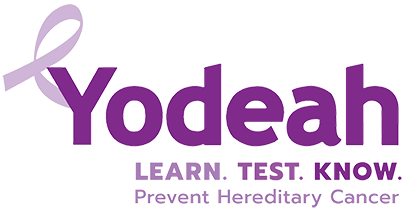
Yodeah endorses testing for BRCA mutations in all Ashkenazi Jews (men and women) regardless of family history, even if they have only one of four Ashkenazi Jewish grandparents. This is called population-based testing in Ashkenazi Jews. This is supported by extensive medical literature as well as guidelines per National Comprehensive Cancer Network (NCCN.org).
Some information you should know before you test:
- This testing is for a genetic mutation on a cancer susceptibility gene, not for cancer itself. If you are found to carry a mutation on a hereditary cancer susceptibility gene such as BRCA, it does not mean you will develop cancer, but your risks of certain cancers are elevated. There are, however, medically proven, established guidelines to decrease cancer risk, including increased screening, medicines to decrease the risk of cancer, and medical procedures.
- The 1 in 40 statistic applies to 3 specific genetic mutations on the BRCA genes. These are called Ashkenazi Jewish founder mutations, and they account for 85% of the BRCA mutations found in Ashkenazi Jews. Sometimes, based on family or personal history, it is important to check for additional genetic mutations on a BRCA gene or other cancer-associated genes.
- Medical guidelines do not recommend testing for a BRCA genetic mutation until age 25, unless there is a family history of cancer at a younger age. This is in part because increased screening for BRCA associated cancers doesn’t begin until age 25, but also because of the importance of maturity in understanding the results and implications. If there is a family history of cancer at a younger age or pediatric cancer, full genetic counseling would be recommended.
- The genetic mutation panel included in our discounted negotiated rate includes full BRCA 1 and 2 testing, not only the three more common Ashkenazi Jewish founder mutations. It also includes other well studied cancer susceptibility genes.
- For medical decision-making, we recommend clinical-grade genetic testing done through clinically certified labs, not recreational genetic tests which may be done through 23andMe or Ancestry. If recreational genetic testing is done, medical guidelines recommend retesting with a clinical-grade lab.
- The Genetic Information Nondiscrimination Act (GINA): In 2008, a federal law was enacted called The Genetic Information Nondiscrimination Act (GINA) which prevents health insurance companies from discriminating against individuals who carry genetic mutations, such as those on the BRCA genes. This law has more limited protections for the military. GINA does not cover life, disability or long-term care insurance. These types of insurance are regulated by state laws and the laws vary from state to state. Please review your state law. You may want to consider having these policies in place prior to genetic testing. For additional information about GINA please visit National Human Genome Research Institute.
- Florida – For policies entered into or renewed after January 1, 2021, Florida enacted a law that, in the absence of a diagnosis of a condition related to genetic information, prohibits health insurers, life insurers and long-term care insurers from canceling, limiting or denying coverage or adjusting premium rates based on genetic information. There are, however, exceptions for other types of coverage.
- Health insurers, long-term care insurers and life insurers are also prohibited from requiring or soliciting genetic information, using genetic test results, or considering a person’s decision regarding genetic testing for insurance purposes.
- Life and long-term care insurers are still able to access a person’s medical record as part of an application exam and consider a medical diagnosis included in a medical record, even if based on the results of a genetic test.
- Please see Florida Statutes Section 627.4301 and this article for additional information: Click Here to Learn More.
- Your results should be put into the context of your personal and family history. This means that even if your genetic testing is negative, but you have a family history of cancer, your healthcare provider may still recommend enhanced screening or medicines to prevent cancer.
- Most cancer is sporadic, meaning not related to a hereditary cancer genetic mutation like those found on BRCA genes. It is essential to continue cancer screening per medical guidelines based on age and personal and family medical history.
The information provided does not, and is not intended to, constitute legal advice. It is for general informational purposes only and may not constitute the most up-to-date legal or other information. Readers of this website should contact their attorney to obtain advice with respect to any particular legal matter. No reader, user, or browser of this site should act or refrain from acting on the basis of information on this site without first seeking legal advice from counsel in the relevant jurisdiction. The content is provided “as is”; no representations are made that the content is error-free.
Yodeah’s mission is to educate the Jewish community about hereditary cancer genetic mutations and provide access to affordable, clinical grade testing. Yodeah does not give medical advice. We recommend you contact your health care professional for any questions about cancer or genetic testing. Genetic testing is not a substitute for visits to health care professionals for recommended screenings or appropriate follow ups.




